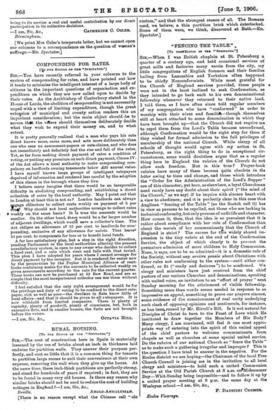COMPOUNDING FOR RATES.
['re TIM EDITOR OF Till ...SPECTATOR:1
Slit,—Yon have recently referred in your columns to the system of compounding for rates, and have pointed out how it tends to minimise the intelligent interest of a large body of citizens in the important questions of organisation and ex- penditure on which they are now called upon to decide by their votes. As the Archbishop of Canterbury stated in the House of Lords, the abolition of compounding is not necessarily urged with a view of limiting expenditure, though the great exteision of municipal and county action renders this an important consideration ; but the main object should .be to secure that the voters should themselves deliberately decide what they wish to expend their money on, and to what extent.
It is pretty generally realised that a man who pays his rate direct knows more, cares more, and acts more deliberately than one who sees no assessment-papers or rate-claims, and who does not immediately and definitely feel the rise and fall of the rates, Yet, so far from making direct payment of rates a condition of voting, or putting any premium on such direct payment, Clause IV. of the Act allows a local authority to make compounding com- pulsory on landlords owning tenements below .220 annual value. I have myself known large groups of intelligent ratepayers deprived of information and rendered less careful by the adoption of this clause in the borough where they live.
I believe many imagine that there would be an insuperable difficulty in abolishing compounding, and establishing a direct collection of rates by the local authority. May I point out that in London at least this is not so ? London landlords can always gitgage collectors to collect rents weekly on payment of 5 per AO Why should not local authorities arrange to collect rates • weekly on the same basis ? It Is true the amounts would be smaller. On the other hand, there would be a far larger number of adjacent dwellings, which would save a collector's time. The Act obliges an allowance of 15 per cent. to landlords for com- pounding, exclusive of any allowance for unlets. That leaves 10 per cent. to compensate for loss or to benefit local funds.
A far less satisfactory plan, but a step in the right direction, pending Parliament or the local authorities altering the present unsatisfactory system, is open to any owner who decides to collect a fixed rent, and a rate which rises and falls with that levied. This plan I have adopted for years where I cannot arrange for direct payment by the occupier. But it is rendered far easier now by the preparation by the Poplar Municipal Alliance of rent- books containing scales for the amounts to be collected weekly on given assessments according to the rate for the current quarter. These books can now be purchased at 52 Bow Road, and are so simple that the most inexperienced collector can use them without difficulty.
I feel satisfied that the only right arrangement would be for the privilege and duty of voting to be confined to the direct rate- payer, rich as well as poor—the dwellers in flats know little of local affairs—and that it should be given to all ratepayers. It is now withheld from limited companies. There is plenty of capacity, plenty of goodwill, plenty of conscience, but, both in expensive fiats, and in smaller houses, the facts are not brought before the voters.






































 Previous page
Previous page